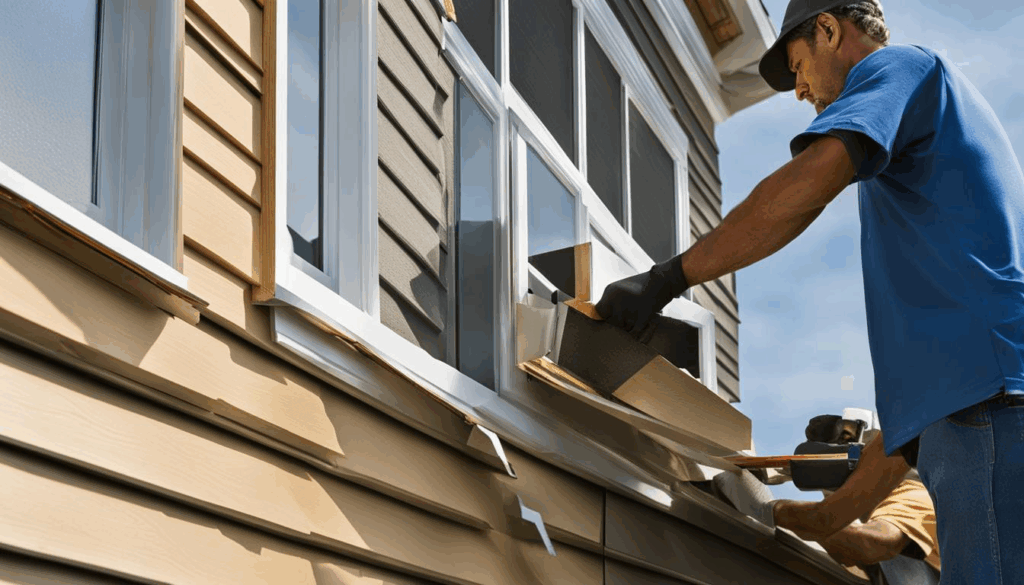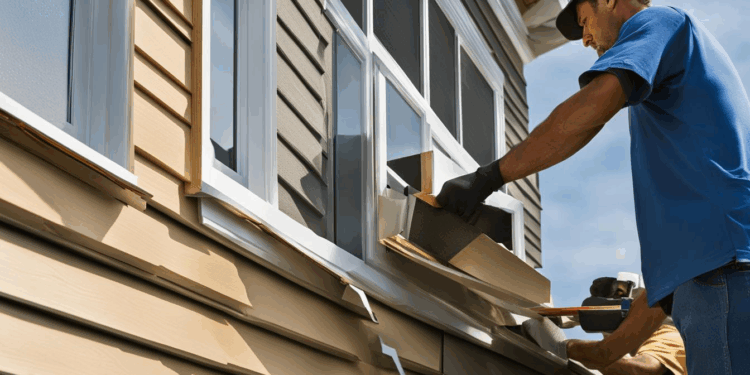
Exploring the world of siding installation companies, this article delves into the key aspects of finding the perfect fit for your home. From different materials to the installation process, we cover it all to help you make an informed decision.
Types of Siding Materials
When it comes to siding materials, there are several options available to homeowners. Each type of material has its own set of advantages and disadvantages, so it’s important to consider your specific needs and preferences before making a decision.
Vinyl Siding
Vinyl siding is one of the most popular choices for homeowners due to its affordability and low maintenance requirements. It comes in a variety of colors and styles, making it versatile for different architectural designs. However, vinyl siding can crack or fade over time, and it may not be as durable as other materials.
Wood Siding
Wood siding offers a classic and natural look to homes, adding warmth and character. It is a renewable resource and can be easily painted or stained to match your desired aesthetic. However, wood siding requires regular maintenance, such as painting or sealing to protect it from moisture and pests.
Fiber Cement Siding
Fiber cement siding is a durable and fire-resistant option that mimics the look of wood without the high maintenance requirements. It is resistant to rot, pests, and harsh weather conditions, making it a long-lasting choice for homeowners. However, fiber cement siding can be more expensive than vinyl or wood siding.
Metal Siding
Metal siding is known for its strength and durability, offering excellent protection against harsh elements such as wind, rain, and hail. It requires minimal maintenance and is available in various finishes and colors. However, metal siding may dent or scratch easily, and it can be prone to rust if not properly maintained.
Siding Installation Process
Installing siding involves several key steps to ensure a successful and long-lasting result. Proper preparation of the exterior wall, the right tools and equipment, and attention to detail are crucial for a professional finish.
Preparing the Exterior Wall
To prepare the exterior wall for siding installation, it is important to:
- Clean the surface thoroughly to remove any dirt, debris, and loose paint.
- Inspect the wall for any damage or rot that needs to be repaired before installing the siding.
- Apply a weather-resistant barrier to protect the wall from moisture and improve insulation.
- Install flashing around windows, doors, and other openings to prevent water penetration.
Tools and Equipment Needed
For a successful siding installation, the following tools and equipment are essential:
- Vinyl siding cutter for precise cuts.
- Hammer or nail gun for securing the siding to the wall.
- Level to ensure the siding is installed straight and even.
- Tape measure for accurate measurements.
- J-channel and utility knife for finishing touches and trim work.
- Scaffolding or ladder for reaching higher areas safely.
Hiring a Siding Installation Company
When it comes to selecting a siding installation company, there are a few key factors to consider to ensure you are hiring a reputable and reliable service provider. From checking licenses and insurance to comparing quotes, here are some important tips to keep in mind.
Checking Licenses, Insurance, and Certifications
Before hiring a siding installation company, it is crucial to verify that they are properly licensed, insured, and certified. A valid license indicates that the company has met the necessary requirements and regulations to operate in your area. Insurance coverage protects you as a homeowner in case of any accidents or damages that may occur during the installation process.
Additionally, certifications from reputable organizations demonstrate the company’s commitment to quality workmanship and industry standards.
Requesting Quotes and Comparing Estimates
When looking for a siding installation company, it is advisable to request quotes from multiple companies to compare their estimates. This will help you get a better understanding of the average cost for your project and ensure you are not overcharged.
Be sure to provide detailed information about the scope of work to each company to receive accurate quotes. Compare the quotes based on the materials used, labor costs, and any additional services included in the estimate. Ultimately, choose a company that offers a fair price while maintaining high-quality standards in their work.
Cost Factors and Budgeting
When it comes to siding installation, the overall price can be influenced by various cost factors. It’s important to understand these factors and plan your budget accordingly to avoid any financial surprises during the project.
Cost Factors Influencing Siding Installation
- The size of your home: Larger homes will require more materials and labor, resulting in higher costs.
- The type of siding material chosen: Different materials like vinyl, wood, fiber cement, or metal have varying costs per square foot.
- Accessibility of your home: If your home is difficult to access or has unique architectural features, the installation process may be more complex and costly.
- Additional services needed: Factors like trim work, insulation, and removal of old siding can add to the overall cost.
Tips for Budgeting a Siding Installation Project
- Get multiple quotes from different siding installation companies to compare prices and services offered.
- Set aside a contingency fund for any unexpected expenses that may arise during the project.
- Consider the long-term benefits of higher-quality siding materials, even if they come with a higher upfront cost.
- Plan ahead and schedule your siding installation during off-peak seasons to potentially save on labor costs.
Cost-Saving Measures and Financing Options
- Explore financing options offered by siding installation companies or through home improvement loans to spread out the cost over time.
- Consider DIY options for simple siding repairs or installations to save on labor costs.
- Ask your siding installation company about any discounts, promotions, or rebates that may be available to help lower the overall cost.
Summary
In conclusion, selecting the right siding installation company is crucial for the longevity and aesthetic appeal of your home. By considering the factors discussed in this guide, you can confidently move forward with your siding project.
General Inquiries
What factors should I consider when choosing a siding installation company?
Look for experience, customer reviews, and certifications to ensure quality work.
Is vinyl siding a good choice for my home?
Vinyl siding is durable, low maintenance, and cost-effective, making it a popular choice for many homeowners.
How can I prepare my walls for siding installation?
Clean the surface, repair any damage, and ensure proper insulation before installing siding.
Are there financing options available for siding installation projects?
Some companies offer financing or payment plans to help homeowners manage the cost of siding installation.














